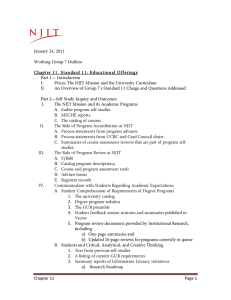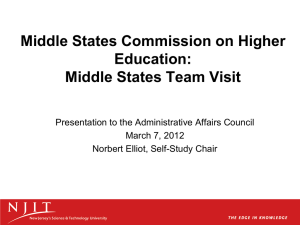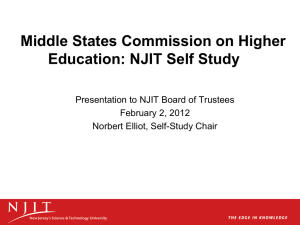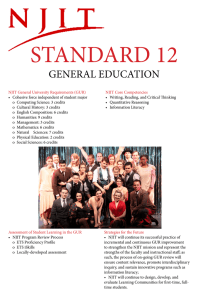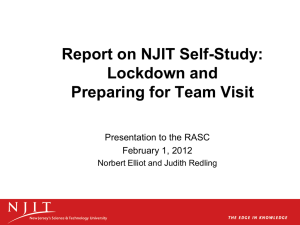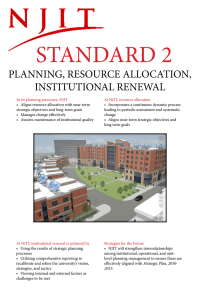STANDARD 12: GENERAL EDUCATION REPORT OF WORKING GROUP 7: CURRICULUM:
advertisement
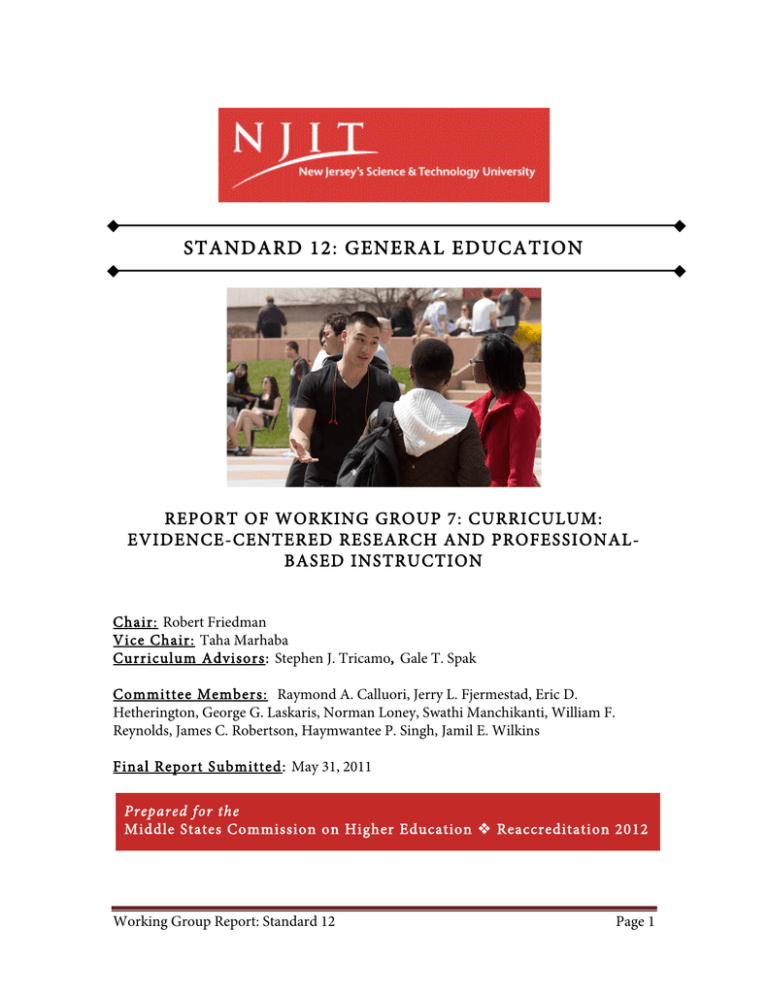
STANDARD 12: GENERAL EDUCATION REPORT OF WORKING GROUP 7: CURRICULUM: EVIDENCE-CENTERED RESEARCH AND PROFESSIONALBASED INSTRUCTION Chair: Robert Friedman Vice Chair: Taha Marhaba Curriculum Advisors: Stephen J. Tricamo, Gale T. Spak Committee Members: Raymond A. Calluori, Jerry L. Fjermestad, Eric D. Hetherington, George G. Laskaris, Norman Loney, Swathi Manchikanti, William F. Reynolds, James C. Robertson, Haymwantee P. Singh, Jamil E. Wilkins Final Report Submitted: May 31, 2011 Prepared for the Middle States Commission on Higher Education Reaccreditation 2012 s Working Group Report: Standard 12 Page 1 TABLE OF CONTENTS 12.0 W ORKING GROUP ASSESSM ENT CHECKLIST FOR STANDARD 12 3 12.1 INTRODUCTION 4 12.1.1 Précis: The NJIT Mission and the General University Requirements 12.1.2 An Overview of Group 7’s Standard 12 Charge and Questions Addressed 4 5 12.2 SELF STUDY INQUIRY AND OUTCOM ES 6 12.2.1 The General University Requirements and the NJIT Mission 12.2.2 GUR Changes Since 2002 12.2.3 The GUR’s Role in College-Level Skill Development 12.2.4 Proficiency Demonstration in the GUR 12.2.4.1: GUR Components Table 12.2.5 Learning Outcomes and Assurance of Learning 12.2.6 Written Communication, Quantitative Reasoning, and Information Literacy 12.2.7 The Future of the General University Requirements 12.2.7.1 New Degree Program Initiatives and the GUR Review 12.2.7.2 The GUR and the Engagement and Retention of Students 6 7 8 8 8 9 10 11 11 12 12.3 CRITICAL ANALYSIS AND CONCLUSIONS 12 12.4 COLLABORATION W ITH OTHER W ORKING GROUPS 13 12.5 RECOM M ENDATIONS FOR IM PROVEM ENT 13 12.5.1 Recommendations Table: Standard 12: General Education 14 Working Group Report: Standard 12 Page 2 12.0 WORKING GROUP ASSESSMENT CHECKLIST FOR STANDARD 12 FUNDAMENTAL ELEMENTS OF GENERAL EDUCATION (From Characteristics of Excellence in Higher Education: Requirements of Affiliation and Standards of Accreditation. Philadelphia, PA: MSCHE, 2009) a program of general education of sufficient scope to enhance students’ intellectual growth, and equivalent to at least 15 semester hours for associate degree programs and 30 semester hours for baccalaureate programs (12.2.4); a program of general education where the skills and abilities developed in general education are applied in the major or concentration (12.2.3 and 12.2.4); consistent with institutional mission, a program of general education that incorporates study of values, ethics, and diverse perspectives (12.2.1); institutional requirements assuring that, upon degree completion, students are proficient in oral and written communication, scientific and quantitative reasoning, and technological competency appropriate to the discipline (12.2.3); general education requirements clearly and accurately described in official publications of the institution (12.1.1 and 12.2.2); and assessment of general education outcomes within the institution’s overall plan for assessing student learning, and evidence that such assessment results are utilized for curricular improvement (12.2.7.2). Working Group Report: Standard 12 TEAM EVALUATION 4=EXEMPLARY 3=EMERGING EXCELLENCE 2=MEETS STANDARD 1=DEVELOPING COMPETENCY 3 3 3 3 3 3 Page 3 12.1 INTRODUCTION 12.1.1 Précis: The NJIT Mission and the General University Requirements The General University Requirements (GUR) constitute the core framework of undergraduate education at NJIT. In accordance with the university’s mission “to prepare students for productive careers and amplify their potential for lifelong personal and professional growth,” NJIT is dedicated to producing graduates who have the knowledge, skills and motivation necessary to advance the state-of-the-art knowledge in their respective fields. Graduates must understand the complexities of contemporary society and have a deep understanding of, and appreciation for, science and technology and the ethical and societal issues involved in their pursuit. The GUR is the formulation of a foundational curriculum encompassing the necessary preconditions for success in undergraduate disciplines, a curriculum that establishes a devotion to lifetime intellectual discovery and personal development. Courses fulfilling the GUR are intended to provide an educational grounding for our students, a set of educational experiences harmoniously attuned to the mission of NJIT and its responsibilities to its constituents. In essence, the completion of the GUR is a necessary step in the fulfillment of the implicit intellectual and social contract—“to both its urban environment and the broader society of the state and nation”—that NJIT has with its students and its local, national and global communities. Nevertheless, our assessment—based on research undertaken to complete this report (Institutional Research and Planning, 2007-2011) and issuing from the Task Force on Retention and Graduation (Altenkirch, 2011)—suggests that change is needed if NJIT is to enhance mission fulfillment through the GUR. The Reviewer’s Report on the 2007 periodic review notes that “more than 40% of NJIT students who enroll as first-year students at NJIT do not complete their degrees” (Mayberry and Berliner, 2007). As we continue to investigate ways to increase the rate of degree completion, the role of the General University Requirements will require investigation. Several recent curricular and placement changes, specifically in the Department of Mathematical Sciences, were made with retention in mind (Altenkirch, Task Force, 2011; Gatley et al., Final Report, 2011). These strategies suggest that “programs that build student community within a curricular and intellectual context be strongly considered, as such initiatives will be necessary to improve student quality, increase retention and graduation rates.” In addition, the Community Connections pilot program (Redling, 2011), the Mathematics requirement (Mathematical Sciences, 2011), the Communication pre-requisite structure (Humanities, 2011), and the attendance policy (Undergraduate Curriculum Review Committee, 2011) have recently undergone revision with the goal of increasing curricular offerings and student retention while also decreasing time to Working Group Report: Standard 12 Page 4 graduation. As our report demonstrates, NJIT is meeting the complex challenges that face mission fulfillment as the state’s science and technology university. 12.1.2 An Overview of Group 7’s Standard 12 Charge and Questions Addressed Standards of excellence concerning general education include a sufficient scope to enhance students’ intellectual growth, where the skills and abilities developed in general education are applied in the major or concentration; consistent with institutional mission, a program of general education that incorporates study of values, ethics, and diverse perspectives; conforms to institutional requirements assuring that, upon degree completion, students are proficient in oral and written communication, scientific and quantitative reasoning, and technological competency appropriate to the discipline; and have outcomes that are within the institution’s overall plan for assessing student learning. To investigate NJIT’s general educational program and analyze the depth of mission fulfillment achieved through these core competencies, the steering committee and working group 7 jointly developed the following charge questions: 1. How do the General University Requirements (GUR)— NJIT’s undergraduate general education program—lead to students acquiring and demonstrating college-level proficiency in general education and essential skills, including oral and written communication, scientific and quantitative reasoning, critical analysis and reasoning, information literacy, and technological competency? (Section 12.2.1) 2. How are learning outcomes demonstrated in the GUR? (Section 12.2.5-12.2.6) 3. How does the GUR serve the NJIT mission? (Sections 12.2.1 and 12.2.3) 4. What is the orientation of the GUR? Is the general education program designed to meet the needs of students in their respective professional degree programs? Or is the general education program designed to be a cohesive force independent of student major? (Sections 12.2.3 and 12.2.7) 5. As learning outcomes and assurance of learning are integrated into the GUR, how is the validity of the interaction established? (Sections 12.2.4-12.2.4.1 and 12.2.512.2.6) 6. As NJIT assesses that students are meeting the institution’s goals for written communication, quantitative reasoning, information literacy, how is that assessment process validated? (Section 12.2.5-12.2.6) 7. How and why has the GUR changed since the previous self study? How have these changes reflected a planned system of development aimed to provide a common core of study for a 21st century science and technology university? (Sections 12.2.2, 12.2.7.1 and 12.2.7.2) 8. Since there is an on-going need to undertake review of the GUR in light of new degree program initiatives during the period of the current self study, how can the GUR be structured to engage and retain students? Working Group Report: Standard 12 Page 5 While Working Group 7 collaborated with each of the groups in question design and cross-reference of material, we worked closely with Group 4 on the assessment of educational outcomes. The material that follows adheres to the evidence-based reporting structure designed by the Rapid Assessment Steering Committee (RASC 2009; Misley, 2007) 12.2 SELF STUDY INQUIRY AND OUTCOMES 12.2.1 The General University Requirements and the NJIT Mission NJIT mission is to serve as a public, urban, research university that is committed to the pursuit of excellence in undergraduate, graduate and continuing professional education, preparing students for productive careers and amplifying their potential for lifelong personal and professional growth. Through conducting research in multidisciplinary areas and serving both local communities and the broader society of the state and nation, conducting public policy studies, and making educational opportunities widely available and initiating community-building projects, NJIT contributes to the state's economic development by preparing students to enter the workforce and become prominent participants in their business and civic communities. In order to produce graduates who have the knowledge, skills and motivation necessary to advance the state-of-the-art knowledge in their respective fields, all students participate in coursework that guides their understanding of the complexities of contemporary society, appreciate science and technology, and be conversant with the ethical and societal issues involved in their disciplinary pursuit. A fundamental guiding principle in the development of the General University Requirements (GUR) is the formulation of a foundational curriculum encompassing the necessary preconditions for success in undergraduate disciplines, a curriculum that establishes a devotion to lifetime intellectual discovery and personal development. In a larger sense, the GUR are intended to provide an educational grounding for our students, a set of educational experiences harmoniously attuned to the mission of NJIT and its responsibilities to its constituents. In essence, the completion of the GUR is a necessary step in the fulfillment of the implicit intellectual and social contract that NJIT has with its students and its local, national and global communities. The general education program is designed to be a cohesive force independent of student major. It provides an understanding of the nature of computing, its impact on society and the driving forces behind its pervasive deployment is integral to effective functioning as a professional and as a citizen; an appreciation of history and the world’s cultures; the ability to communicate ideas and achieve proficiency in both oral and written English; contextualize any particular major field or career goal within the context of humanistic study; develop the management skills needed to function effectively in an organizational setting as well as the ability to reason qualitatively and quantitatively, to understand probability, and to apply mathematical models to a variety of circumstances is Working Group Report: Standard 12 Page 6 fundamental to making informed decisions in the modern world. The natural sciences provide the basis for knowledge of the physical universe and for technological progress; physical education conveys to students the importance of good health and fitness through planned exercise and recreational activities; and the social sciences provide an understanding of the economic, social, and political forces at work in our world. 12.2.2 GUR Changes Since 2002 There have been significant changes to the General University Requirements since the previous self study. These include: • Enhanced descriptive prose of the philosophy behind the GUR in the 2009-2010 catalog. The reason for this was the sense of the University Curriculum Review Committee, which is charged with maintaining and updating the GUR, that the existing description, maintained unchanged for approximately ten years, did not strenuously enough express that “In essence, the completion of the GUR is a necessary step in the fulfillment of the implicit intellectual and social contract that NJIT has with its students and its local, national and global communities.” • An increase in Computing Science credits from two to three and an expansion of options available to students. This resulted from faculty from the Newark College of Engineering requesting increased instruction in computer programming, in recognition of the fact that students will increasingly be called on to interface with a variety of malleable software applications, while students in other majors in which programming is not a significant activity, would have alternatives that included the use of productivity software or a general introduction to the history and social significance of computing in the modern world. • The elimination of six credits of Engineering Technology. The reasons for this change are based in the ability of the Newark College of Engineering to satisfy this requirement within degree programs. As well, this requirement was no longer applicable to all NJIT degrees. • The addition of HSS 100 as the credit-bearing English Composition course for students who placed into Basic Writing. The reasons for this curricular change included the identification of increasing numbers of students for whom one semester of Basic Writing proved insufficient preparation for 200- through 400level courses and an opportunity for these students to participate in a second writing class whose enrollment cap was 15% lower than English Composition. Additional tutoring was also made available to this cohort in order to aid them in successful completion of the Humanities GUR. • The most recent changes involve the addition of a second writing course, HUM 102, which for the past two years served as an option to three of the six credits of cultural history. This course was implemented based on the requests of faculty universitywide to increase the writing and oral presentation proficiencies of lower division students, as well as to facilitate the transfer of English Composition credits from NJ Community Colleges, where a full year sequence is the norm. In Spring 2011, the Working Group Report: Standard 12 Page 7 UCRC and CAA passed a GUR change that includes making HUM 102 prerequisite to any cultural history course. This resulted from the fact that nearly every program on campus recognized the value in a second writing course and advised their freshmen to take it. 12.2.3 The GUR’s Role in College-Level Skill Development GUR fulfillment is described in the ABET/SOA/SOM accreditation processes in degree program self-studies. (See Working Group Report, Standard11). GUR fulfillment is also achieved by the Research Roadmap, an information literacy skills program developed by librarians of the Van Houten Library, first deployed in 2008. Described fully in the Working Group Report on Standard 11, the Research Roadmap is now online and available to all students. With a target audience of students enrolled in HUM 101 and HUM 102, the English composition sequence, Research Roadmap can be used to assess skills such as identifying appropriate secondary sources, incorporating information found outside primary texts into one’s own writing, and properly citing source material. 12.2.4 Proficiency Demonstration in the GUR The General University Requirements (GUR) for NJIT undergraduates are summarized in Table 12.2.4.1: GUR Components below. 12.2.4.1: GUR Components Table GUR DISCIPLINE Computing Sciences Cultural History English DESCRIPTION An understanding of the nature of computing, its impact on society and the driving forces behind its pervasive deployment is integral to effective functioning as a professional and as a citizen. Each student should learn to use software and computing systems and to access, store, process and analyze information as an essential aspect of critical thinking and problem solving. Depending on the discipline, the student should also develop an ability to design algorithms, to write programs, and to use software tools. All educated individuals are expected to understand and appreciate history and the world’s cultures. The ability to communicate ideas is an essential characteristic of educated individuals. All students are expected to achieve proficiency in both oral and written English. Working Group Report: Standard 12 NUMBER OF CREDITS 3 credits 3 credits 6 credits of English composition Page 8 Humanities The ideals of a liberal education transcend particular major fields and career goals. All students are expected to develop an interest in specific areas within the humanities. Management All students are expected to develop the management skills needed to function effectively in an organizational setting. The ability to reason qualitatively and quantitatively, to understand probability, and to apply mathematical models to a variety of circumstances is fundamental to making informed decisions in the modern world. Depending on the discipline, the student should also be able to apply calculus and numerical methods to the solution of problems in their professional domain. The natural sciences provide the basis for our knowledge of the physical universe and for technological progress. All students are expected to develop a thorough understanding of at least one laboratory science. Physical education conveys to students the importance of good health and fitness through planned exercise and recreational activities. An understanding of the social sciences is essential in order to understand the economic, social, and political forces at work in our world. Mathematics Natural Sciences Physical Education Social Sciences 6 credits of junior-level electives; 3 credits of senior seminar 3 credits 6 credits, including at least 1 credit of probability and statistics 7 credits, including at least 1 credit of lab experience 2 credits 6 credits Demonstration of proficiency differs among disciplines. The Department of Humanities conducts semi-annual portfolio assessments for its composition courses and bi-annual portfolio assessments for its cultural history and upper division courses, each in addition to individual instructors grading individual and group writing assignments and presentations. The Department of Mathematical Sciences and the Physics and Chemistry and Environmental Science Departments conduct common exams throughout the semester for its first-year offerings, with all instructors grading exams written by students not on their own rosters. Exams and projects make up the assessment vehicles for management, computing, and social science, while successful and satisfactory completion of assigned tasks in physical education courses demonstrates student proficiency. (See Working Group Report, Standard 14). • NSSE survey results • EST Profile Proficiency results • ETS iTC test results summaries 12.2.5 Learning Outcomes and Assurance of Learning A recent change to the Course Catalog includes a revised attendance policy for undergraduates stating that: Working Group Report: Standard 12 Page 9 • All undergraduates, not just freshmen, are expected to attend all regularly scheduled classes. In the case of hybrid and fully online classes, participation in discussion forums and other required online activities is expected. • Students who expect to miss classes or exams because of religious observance must submit to their instructors, by the end of the second week of classes, a written list of dates that will be missed. Students are expected to make up missed work. Faculty are expected to make reasonable attempts to accommodate students who are appropriately following this policy. • Instructors are obligated to explain clearly, on all syllabi to be distributed at the beginning of each semester, what is expected of students in terms of activities such as class participation, reading assignments, and reports and how these activities factor into student grades. A recent change to the F/W policies in the College of Science and Liberal Arts, including a minimum ‘C’ grade for any course that is pre-requisite to another, was adopted by the College of Computing Sciences for its programs in Computer Science, and most recently for undergraduate programs in the Newark College of Engineering. The purpose of this policy is to ensure that students have a reasonable grasp of foundational information necessary for satisfactory progress through sequences of related courses. • Course assessment result reviews (See Working Group Report, Standard 14) 12.2.6 Written Communication, Quantitative Reasoning, and Information Literacy • Portfolio reviews • ETS Proficiency Profile results • Math Common Exams All incoming first-year students and transfer students who have not transferred the GUR in Mathematics are required to take a Mathematics Placement exam. The exam consists of four different parts designed to assess students' abilities in standard High School mathematical concepts such as algebra, trigonometry and geometry. Based on the exam, students are placed directly into a GUR satisfying course that is specific to their major, or into one of two remedial mathematics tracks. The different remedial tracks deliver content specific to whether a student intends to pursue a technical/engineering/scientific or a humanities/architecture/management major. The former prepares students to understand calculus, while the latter prepares students to be able to understand the applications of general mathematical concepts. Several courses with multiple sections utilize a common exam system. Each course uses a common syllabus and common homework, midterms and final exams across its multiple sections. The main purpose of this system is to ensure a level of uniformity across all sections. This guarantees that students who have passed this course know the same base Working Group Report: Standard 12 Page 10 set of material independent of the instructor who taught them. It is an essential way of ensuring that students are adequately prepared for higher level mathematics, science and engineering courses. • Research Roadmap • ETS iSkills survey results Of central importance to the assessment of student learning is the NJIT Core Competencies, described in more detail in Working Group Report, Standard 14. As noted there as well in our report on Standard 11, at NJIT, assessment of student learning in all degree programs in all majors is performed according to five Institutional Level Goals: (1) research-based inquiry, (2) ethical conduct, (3) economic opportunity, (4) collaboration, and (5) engagement. In a distinct yet related process, there are four performance-based NJIT Core Competencies that are the foundation of the GUR assessment. These four competencies are writing, reading / critical thinking, mathematics, and information literacy. In fulfillment of the University’s participation in the Voluntary System of Accountability, students are examined on these four competencies by the Educational Testing Service’s Proficiency Profile and iSkills test. Complementary to our locally developed assessment processes, these tests yield information about student ability that can be compared to national performance levels at institutions with a mission similar to that of NJIT (Ad Hoc Committee on Assessment, 2011). It is important to note that NJIT has taken a national leadership role in the assessment of information literacy (Scharf, et al., 2007) and the assessment of writing ability (Johnson, 2010). 12.2.7 The Future of the General University Requirements This section of the report describes continuing efforts to improve the general education program at NJIT. 12.2.7.1 New Degree Program Initiatives and the GUR Review As NJIT continues to expand its degree program offerings, building robustness comprehensively, the GUR remains a fluid and living document that needs cultivation. New degree programs in the College of Architecture and Design, the College of Science and Liberal Arts, the School of Management and the College of Computing Sciences, as well as positive enhancements to engineering programs such as Biomedical Engineering, drive the need for discussions related to sufficient and relevant courses, both quantitative and qualitative, the support the intent of the GUR philosophy while also exposing students to the newest ideas and techniques in their fields of study. Program expansion drove the changes and additions to the Computing and Mathematical Sciences course offerings at the 100-level. As new majors grow, a more comprehensive review and commitment to change needs to be the fundamental purpose of the GUR. Working Group Report: Standard 12 Page 11 12.2.7.2 The GUR and the Engagement and Retention of Students On April 13, 2011, the University Faculty approved the Department of Mathematical Sciences’ change in the GUR to reflect the disciplinary needs of mathematical proficiency for students in non-STEM majors. UCRC approval was obtained to revise the philosophy statement for mathematics to remove the phrase ‘principles of calculus’ from the requirement and reflect mathematical topics appropriate to the discipline. This GUR change advances student retention in that for non-STEM majors who place into the precalculus sequence, they are no longer required to register for anywhere from one to four semesters of additive credit. Placed directly into the mathematics course deemed appropriate by Program Directors, Chairs and Deans, these students will complete a minimum of three credits of Mathematics and three credits of Probability and Statistics. The composition sequence has also recently been revised based on NSSE, ETS Proficiency Profile and ETS iTC survey data. Students will now complete their Communication/Cultural History requirement with six credits of Composition followed by three credits of Cultural History. This change allows the Humanities Department to revise the curricula in its composition course sequence so that all freshmen participate in expository and research writing through focused and intense pedagogies relevant to their fields of study. • Test results • VSA survey and test results • With the onset of NJIT’s Learning Community Initiative in Fall 2011, assessment and survey instruments will be deployed in order to obtain results that will guide changes to and potentially expansion of Learning Communities across years and disciplines. 12.3 CRITICAL ANALYSIS AND CONCLUSIONS Working Group 7 concludes that a level of excellence obtains for the general education program’s consistency with institutional mission. Our program of general education incorporates in a serious and rigorous manner the study of values, ethics, and diverse perspectives. Students and the public can access clear and accurate descriptions of the program in official publications of the institution. It provides a standard of sufficient scope for a program of general education that enhances students’ intellectual growth, one in which, upon degree completion, students are proficient in oral and written communication, scientific and quantitative reasoning, and technological competency appropriate to the discipline. Emerging excellence obtains where the skills and abilities developed in general education are applied in the major or concentration and the assessment of general education outcomes within the institution’s overall plan for assessing student learning, and evidence that such assessment results are utilized for curricular improvement. Working Group Report: Standard 12 Page 12 12.4 COLLABORATION WITH OTHER WORKING GROUPS In scheduled meetings hosted by the Rapid Assessment and Steering Committee, our Working Group collaborated with other groups. Collaboration was also strengthened through meetings with the self study consultant (Robert Clark). Asynchronous communication was fostered through the open source content management system (Moodle); in that platform, the Working Groups collaboratively reviewed each stage of the planning and reporting process, from question design to outlines of the Working Group Reports, to edited review, to final copy. Group 7’s Chair and Co-chair have consulted with leaders of Working Group 4 and 14, sharing data and other information resources to enhance content and share related questions and scope. 12.5 RECOMMENDATIONS FOR IMPROVEMENT Group 7’s first recommendation is to redesign the General University Requirements so that they promote avenues of interdisciplinary inquiry. The desired future for the recommendation is to limit GUR offerings to those that are professionally oriented and promote information literacy. The proposed strategy is to gain consensus through UCRC and CAA on the scope and aims of the GUR, while the specific action recommended to implement the strategy is to charge UCRC with a comprehensive revision of GUR. The metric used to assess success would be, upon implementation of the Task Force recommendation, to have all syllabi with information literacy requirements posted on the Registrar’s web site—with special designation that this is an information literacy intensive course. The second recommendation is to redesign the General University Requirements so that they represent the strengths and capacity of existing faculty. The vision for this recommendation is to redistribute the number of GUR credits across the disciplines to reflect more opportunities for professional, applied experience. This can be achieved by engaging the College of Architecture and Design and the Newark College of Engineering in expanding offerings to non-majors. A specific tactic to achieve this goal is to shift three credits of GUR from Humanities to CoAD and NCE. The metric used to assess success would be to advance the emerging research-based curricular framework with course projects designed and assessed by the Sub-Committee on Assessment for assignments that advance professional and applied experience. Group 7’s third recommendation is to create thematic learning communities in addition to those that are discipline-based. The desired future for the recommendation is for all students to participate in at least one learning community as an undergraduate throughout their career. The methodology recommended to achieve this vision is to move from away from a voluntary model for membership in a learning community while demonstrating the benefits of participation. The specific action recommended to Working Group Report: Standard 12 Page 13 implement this strategy is, for those students not choosing a discipline-based cohort, to offer a choice of NJIT strategic vision options for selection. The metric recommended to measure achievement of the vision is to expand the Learning Community 2011-2012 ViSTA framework to include this new goal. 12.5.1 Recommendations Table: Standard 12: General Education RECOMMENDATION 1 Redesign the General University Requirements so that they promote avenues of interdisciplinary inquiry. VISION: The desired future for the recommendation Limit GUR offerings to those that are professionally oriented and promote information literacy. Gain consensus through UCRC and CAA on the scope and aims of the GUR. Charge UCRC Task Force with a comprehensive revision of GUR. Post information literacy intensive courses on the Registrar’s web site—with special designation that this is an information literacy intensive course. STRATEGY: The methodology recommended to achieve the vision TACTIC: The specific action recommended to implement the strategy ASSESSMENT: The metric recommended to measure achievement of the vision RECOMMENDATION 2 Redesign the General University Requirements so that they represent the strengths and capacity of existing faculty. VISION: The desired future for the recommendation Redistribute the number of GUR credits across the disciplines to reflect more opportunities for professional, applied experience. Engage the College of Architecture and Design and the Newark College of Engineering in expanding offerings to non-majors. Shift three credits of GUR from Humanities to CoAD and NCE. Advance the emerging research-based curricular framework with course projects designed and assessed by the Sub-Committee on Assessment for assignments that advance professional and applied experience STRATEGY: The methodology recommended to achieve the vision TACTIC: The specific action recommended to implement the strategy ASSESSMENT: The metric recommended to measure achievement of the vision Working Group Report: Standard 12 Page 14 RECOMMENDATION 3 Create thematic learning communities in addition to those that are discipline-based. VISION: The desired future for the recommendation STRATEGY: The methodology recommended to achieve the vision All students participate in at least one learning community as an undergraduate. Shift from a voluntary model for membership in a learning community while demonstrating the benefits of participation. For those students not choosing a discipline-based cohort, offer a choice of NJIT strategic vision options for selection. Expand the Learning Community 2011-2012 ViSTA framework to include this new goal. TACTIC: The specific action recommended to implement the strategy ASSESSMENT: The metric recommended to measure achievement of the vision Working Group Report: Standard 12 Page 15 References Ad Hoc Committee on Assessment. Assessment of NJIT Core Competencies. Newark: NJIT, 2011. Altenkirch, Robert. Task Force on Retention and Graduation. Newark: NJIT, 2011. Web. Gatley, Ian, et al. Final Report: Task Force on Undergraduate Retention and Graduation. 2011. Web. Humanities. Mathematical Sciences. Approved Motion to Change the General University Requirements: April13, 2011. Newark, NJIT, 2011. Institutional Research and Planning. Time to Graduation Studies. Newark, NJIT, 20072011 Johnson, Carol, et al. “Undergraduate Technical Writing Assessment: A Model.” Programmatic Perspectives, 2.2 (2010): 110-151. NJIT Catalogue. General University Requirements. Newark: NJIT, 2011. Web. Mayberry, Katherine (2010). Teaching and Learning in Community: Presentation and Podcast Series. Newark; NJIT, 2010. Mathematical Sciences. Approved Motion to Change the General University Requirements: April13, 2011. Newark, NJIT, 2011. Mayberry, Katherine and Herman Berliner. Report to Faculty, Administration, Trustees, Students of New Jersey Institute of Technology, University Heights, Newark, NJ Prepared Following Analysis of the Institution’s Periodic Review Report. MSCHE, 2007. Mislevy, R. J. “Validity by Design.” Educational Researcher 36 (2007): 463–469. RASC. Accreditation: Accountability in the 21st Century: Podcast. Newark, NJIT: 2009. Redling, Judith (2011). Learning Communities. Newark, NJIT, 2011. Web. Davida Scharf, et. al. “Direct Assessment of Information Literacy Using Writing Portfolios.” The Journal of Academic Librarianship 33.4 (2007): 462-478. Undergraduate Curriculum Review Committee. Attendance Policy. Newark, NJIT, 2011. Working Group Report: Standard 12 Page 16
